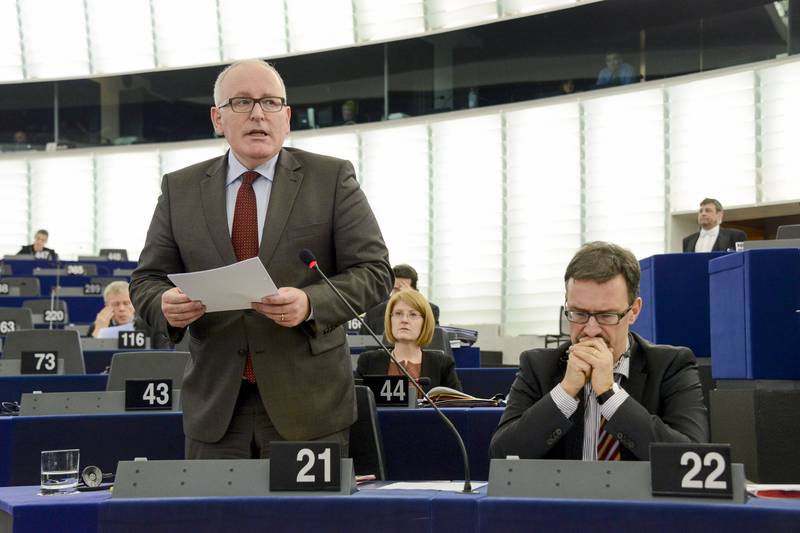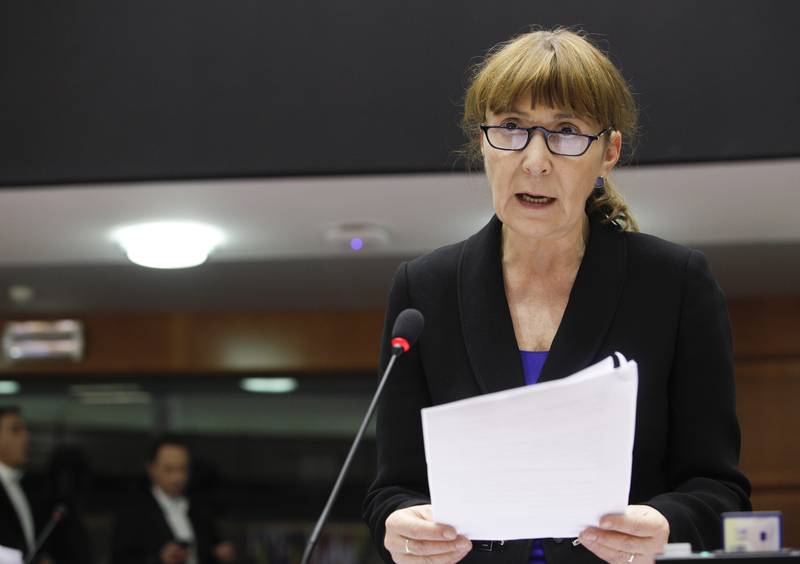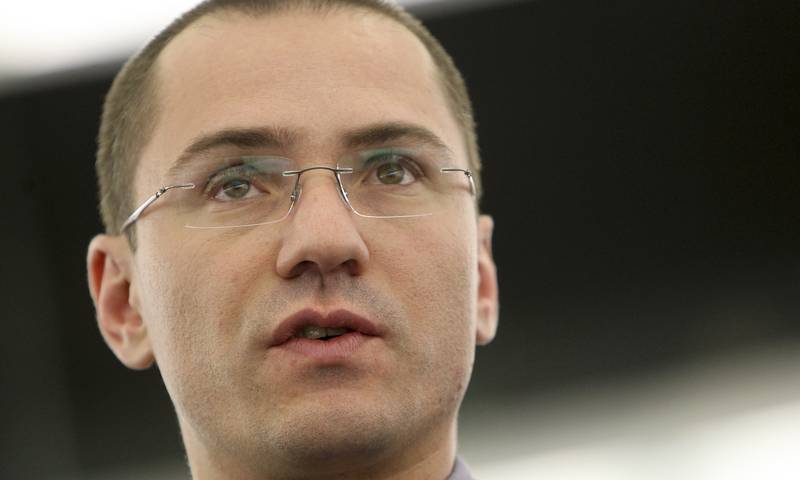EP Pushes for Strong Rule of Law Mechanism, Council and Commission Are Against
Adelina Marini, March 2, 2015
 After, in December, the member states threw a cold shower on the ambitions for a common European rule of law mechanism, the European Parliament demonstrated an amazing unity during the first debate on the issue on 11 February. In the mean time, the Liberal group in the European Parliament (ALDE) has proposed the establishment of a pact for democratic governance which practically copies the economic governance of the EU. The European Commission, however, this time, is on the side of the member states. This suggests that, may be, the battle for the rule of law of the EU is not lost but rather it is yet to unfold.
After, in December, the member states threw a cold shower on the ambitions for a common European rule of law mechanism, the European Parliament demonstrated an amazing unity during the first debate on the issue on 11 February. In the mean time, the Liberal group in the European Parliament (ALDE) has proposed the establishment of a pact for democratic governance which practically copies the economic governance of the EU. The European Commission, however, this time, is on the side of the member states. This suggests that, may be, the battle for the rule of law of the EU is not lost but rather it is yet to unfold.
For the sake of sovereignty
In the end of its mandate, Jose Manuel Barroso's Commission presented a proposal for the establishment of a common European mechanism for protection of the rule of law and the EU fundamental values which envisages much stricter sanctions for violations, including an easier path to trigger the Union's "nuclear option" which is Article 7 of the Treaty that suspends a member state from its voting rights in the Council if it is systemically violating key provisions of the Treaties. The proposal, prepared under the leadership of the then commissioner for justice and citizenship and vice president, Viviane Reding, was provoked by the authoritarianisation of Hungary under the premiership of Viktor Orban and was inspired by the Cooperation and Verification Mechanism which Bulgaria and Romania were accepted in the EU with under the condition that they will complete the reforms of their judiciaries and will fight corruption and organised crime.
Since the presentation of the proposal last spring, however, it has become clear that the capitals have strong objections against being closely monitored by the Commission in yet another area. The culmination was in December when the General Affairs Council decided something else - there will be no common European mechanism and the problems with rule of law violations will be viewed once a year in the General Affairs Council (where the ministers of European and foreign affairs are represented). What the ministers have in mind is to hold regular dialogues which will not produce any direct consequences such as sanctions, for instance. According to Bulgarian Deputy Prime Minister Meglena Kuneva, who is responsible for the implementation of the Bulgarian mechanism and European affairs and is a former EU commissioner for consumer protection, the problem is in the giving up of more sovereignty. In an interview with this website she said that justice and home affairs are the very state itself and in this sense it is understandable that the member states are refusing external interference in this area.
The ALDE group in the European Parliament, which ended up a fourth force after the European elections last year, is of the opinion that this is a big mistake. "Democratic governance, the rule of law and fundamental rights are not secondary to single market rules or budget discipline. If anything, they are even more important! it is no coincidence that the values of the European Union are mentioned in Article 2 of the Treaty, before all other aims of the EU", the group says in its introduction to its very concise and detailed proposal for the creation of democratic governance. The essence of their idea is the democratic governance to be put on an equal footing with the Stability and Growth Pact for the euro area. In the past years, the EU has proved incapable or unwilling to discipline its members that do not respect the rules. The fundamental rights are constantly violated which includes deportation of Roma, laws against homosexuals, intimidation of media, undermining of the independence of the judiciary, clandestine mass surveillance programmes, complicity in torture programmes, manipulation and abuse of electoral laws to eliminate opposition parties, impunity for corruption, the Liberals say in their document.
All member states signed the EU treaties but, in practise, they are unwilling to apply the standards and in the same time there are no binding rules, they say standing behind the motivation that led Ms Reding during the preparation of the rule of law mechanism. ALDE are proposing something euinside has been calling for for a long time and which was articulated semi-jokingly by Ivica Dacic, Serbia's first deputy prime minister and minister of foreign affairs - not only the enlargement countries to be subjected to strict monitoring but the member states as well. The situation of their democracy, rule of law and fundamental rights should also be regularly monitored.
Indicators have to be developed about the situation of democracy so that they can regularly be monitored in a special scoreboard. Among these indicators should be the freedom of expression, freedom of press and media pluralism, equality and non-discrimination, freedom of religion, belief, conscience, rule of law, separation of powers, development of the civil society, transparency, rule of law, access to justice. The assessment whether the member states respect the rules should be granted to the European Fundamental Rights Agency, the mandate of which should be expanded and enhanced, ALDE suggest.
The Agency should prepare a report which it will present once a year to the Commission, the European Parliament and the Council. The Liberals do not foresee a new kind of coercion but the well known one - a notification to the member state, a dialogue with it, debates in the national parliament with the Commission, discussing the actions of the member state in the Justice Affairs Council. ALDE are convinced that their idea does not require any treaty change nor additional funding.
Illiberal democracy? There's no such thing
 The mechanism of the previous Commission was discussed in the plenary on 11 February with the first vice president who is in charge of the rule of law. Frans Timmermans began his statement very strongly by quoting the words of President Eisenhower that the clearest way to show how important the rule of law is is to remember what has happened when there is no rule of law. Mr Timmermans said that the EU cannot afford the illiberal logic to take hold. "There is no such thing as an illiberal democracy", he said obviously in response to Hungary Prime Minister Viktor Orban who announced in the summer of last year that he was taking a course toward illiberal democracy following the example of Turkey, Russia and China. Despite these strong words, however, the former Dutch minister for European affairs, Timmermans, defended the decision of the member states to, practically, reject the mechanism and replace it with something so vague and anaemic as an annual dialogue in the General Affairs Council.
The mechanism of the previous Commission was discussed in the plenary on 11 February with the first vice president who is in charge of the rule of law. Frans Timmermans began his statement very strongly by quoting the words of President Eisenhower that the clearest way to show how important the rule of law is is to remember what has happened when there is no rule of law. Mr Timmermans said that the EU cannot afford the illiberal logic to take hold. "There is no such thing as an illiberal democracy", he said obviously in response to Hungary Prime Minister Viktor Orban who announced in the summer of last year that he was taking a course toward illiberal democracy following the example of Turkey, Russia and China. Despite these strong words, however, the former Dutch minister for European affairs, Timmermans, defended the decision of the member states to, practically, reject the mechanism and replace it with something so vague and anaemic as an annual dialogue in the General Affairs Council.
Frans Timmermans tried to convince the MEPs that the existing instruments are still not completely exhausted. "Can we say to our citizens that we need yet another monitoring mechanism to fight against radicalisation and extremism; or do we just need to better use the existing and recently established tools? Experience has shown that there is not so much a need for new reporting or monitoring mechanisms, but rather for the improvement of the European Union's capacity to act and intervene in certain types of crisis situations relating to the rule of law", said Juncker's right hand.
His position, though, met no understanding at all among a majority of MEPs who spoke on the issue, irrelevant of their political affiliations. Members of the EPP, the Socialists and Democrats, but also of Greens, Liberals and even the far left unanimously called for a strong mechanism. The only voices against came from the "British" groups - the European Conservatives and Reformists (ECR) who are practically the voice of David Cameron's Conservatives and Europe of Freedom and Direct Democracy (EFDD) of Cameron's biggest opponent Nigel Farage and his UK Independence Party (UKIP). According to the Romanian MEP Daniel Buda (S&D), the creation of efficient mechanisms that include sanctions is absolutely necessary, especially when the fundamental values can be easily shattered even in established democracies.
Sophia in 't Veld (ALDE, The Netherlands) was disappointed with the position of her countryman, the first vice president. "Article 2 is the most important article and yet the enforcement of that article is the weakest of all", she said. We need binding mechanisms, not just colloquia and debates. She was supported by another Dutch MEP - Judith Sargentini from the group of Greens and the European Free Alliance, who said that the existing rules are not respected because there is no political will in the Council. One of the new MEPs - the Italian Laura Ferrara from the Five Star Movement of Beppe Grillo - contrary to the British wing in the EFDD said that there was a gap between the values and their implementation. Article 7 is dead. The alternative mechanism of the Commission is not ambitious enough. It does not do enough to deal with the violations of the rule of law. We need an appropriate monitoring and sanctions. The Commission has a duty to monitor closely the implementation of all European policies, Laura Ferrara added.
Jeroen Lenaers (EPP, The Netherlands) said that the rule of law is what unites us in Europe. "If we don't have rule of law democracy wouldn't work and the economy wouldn't work. So, practise what you preach!", he said. Juan Fernando López Aguilar (S&D, Spain) said that in the EU there is a political and a moral crisis. We are facing the Copenhagen dilemma - there are obstacles to join the club but once in, there is nothing that can be done. "The Communication is not enough nor is the dialogue. We need effective monitoring mechanisms", the Spanish MEP added. Another Spanish MEP - Fernando Maura  Barandiarán (ALDE) - recalled that in Hungary national TV is simply a tool for government propaganda. It is high time to demand of the EU to ensure that the fundamental rights will be respected.
Barandiarán (ALDE) - recalled that in Hungary national TV is simply a tool for government propaganda. It is high time to demand of the EU to ensure that the fundamental rights will be respected.
The famous with her fight for independent judiciary and with corruption Romanian MEP Monica Macovei brought up another very important issue. "First of all what do we mean by rule of law? How do we have to develop laws? How do we treat suspects of crimes? How do we set and collect taxes? Everything is about the rule of law. The rule of law is the difference between democracy and dictatorship. There is no rule of law when politicians change the law very often because they don't like the law. Everyone should adjust to the law not vice versa". The Hungarian MEP from the S&D group Péter Niedermüller called, despite the fatigue from the events in Hungary, the EU not to leave the citizens whose rights are constrained behind. "We need to ensure that, firstly, we don't turn our backs to the problem. We mustn't hide from reality", he said.
Croatian MEP Ivan Jakovčić (ALDE) said that every intolerance should be punished. We have to start pointing to the good examples because there are such. In support of a strong mechanism with strict sanctions and monitoring spoke a remarkable majority of MEPs. There were, however, voices against. Gerard Batten from Farage's group said that Britain does not need a European framework. "There is nothing the EU can teach the English about democracy, the fundamental rights and rule of law". Timothy Kirkhope (ECR, UK) was also critical. Debates are needed. EP is constantly trying to quantify scientifically values that cannot be quantified - scoreboards, criteria. What is best is to hold debates across the EU. And the most important thing is to create jobs for the young, to remove red tape. We are not each other's masters but each other's partners, he concluded.
Against the mechanism spoke also Angel Dzhambazki, a Bulgarian MEP from ECR, who asked a colleague of his: "Don't you believe that the internal order of a country should be formed by the people of that country?". And the Greek MEPs, as usually since the beginning of the crisis, refracted everything through the crisis prism and spoke in the context of the Greek woes. SYRIZA MEP Kostas Chrysogonus (the far left group) said that the values are put at risk by the very institutions of the EU. We are a debt colony, he relayed the mantra of the new Greek government. "When Commissioner Katainen shamelessly says there will be no change of policies this is a dictatorship", he said. And according to Notis Marias (ECR), who is a member of SYRIZA's coalition partner the Independent Greeks, the Troika should no longer be allowed to violate the human rights.
But nothing of this helped mitigate Frans Timmermans's position. He tried, in conclusion, to assure the MEPs that he is determined to defend the rule of law but without a new mechanism. The argument of democratic majority cannot be used to weaken the foundations of democracy and human rights. This is a fundamental principle. And it cannot be said that this is an interference in the domestic affairs. No one forced any member state to sign and ratify a treaty or a charter, but after this happened it is a national law, he said. Nonetheless, the vice president called on the European Parliament to give the Commission a chance to show that the existing system is working. Frans Timmermans used the occasion to respond t o the Greek MEPs, reminding them that the bailout fund was a sovereign decision of the member states.
o the Greek MEPs, reminding them that the bailout fund was a sovereign decision of the member states.
Zanda Kalniņa-Lukaševica, state secretary for European affairs of Latvia (the current rotating president of the Council), also expressed conviction in the end of the debate that the dialogue will succeed to ensure the rule of law. "The Council remains firm in its commitment that accession is an obligation and not an option. The tools are there, we just need to learn how to use them", she concluded. Alas, this continues to sound unconvincingly.
 Entrance to the Berlaymont building | © EC - Audiovisual Service
Entrance to the Berlaymont building | © EC - Audiovisual Service | © European Union 2020, EC - Audiovisual Service
| © European Union 2020, EC - Audiovisual Service Commission President Ursula von der Leyen | © European Union 2019 - Source: EP
Commission President Ursula von der Leyen | © European Union 2019 - Source: EP